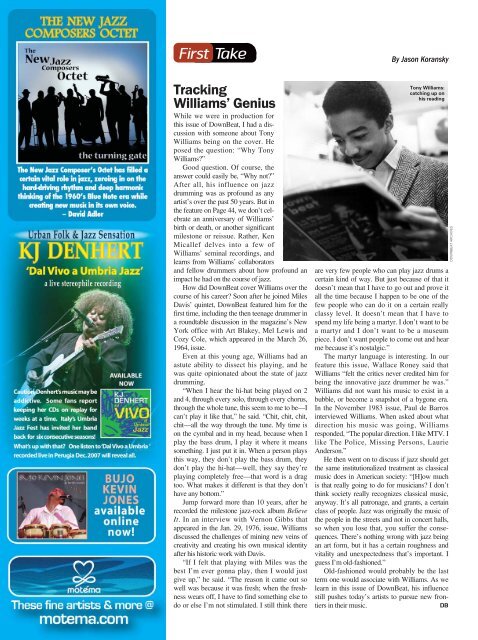Download - Downbeat
Download - Downbeat
Download - Downbeat
- No tags were found...
You also want an ePaper? Increase the reach of your titles
YUMPU automatically turns print PDFs into web optimized ePapers that Google loves.
First TakeBy Jason KoranskyTrackingWilliams’ GeniusWhile we were in production forthis issue of DownBeat, I had a discussionwith someone about TonyWilliams being on the cover. Heposed the question: “Why TonyWilliams?”Good question. Of course, theanswer could easily be, “Why not?”After all, his influence on jazzdrumming was as profound as anyartist’s over the past 50 years. But inthe feature on Page 44, we don’t celebratean anniversary of Williams’birth or death, or another significantmilestone or reissue. Rather, KenMicallef delves into a few ofWilliams’ seminal recordings, andlearns from Williams’ collaboratorsand fellow drummers about how profound animpact he had on the course of jazz.How did DownBeat cover Williams over thecourse of his career? Soon after he joined MilesDavis’ quintet, DownBeat featured him for thefirst time, including the then teenage drummer ina roundtable discussion in the magazine’s NewYork office with Art Blakey, Mel Lewis andCozy Cole, which appeared in the March 26,1964, issue.Even at this young age, Williams had anastute ability to dissect his playing, and hewas quite opinionated about the state of jazzdrumming.“When I hear the hi-hat being played on 2and 4, through every solo, through every chorus,through the whole tune, this seem to me to be—Ican’t play it like that,” he said. “Chit, chit, chit,chit—all the way through the tune. My time ison the cymbal and in my head, because when Iplay the bass drum, I play it where it meanssomething. I just put it in. When a person playsthis way, they don’t play the bass drum, theydon’t play the hi-hat—well, they say they’replaying completely free—that word is a dragtoo. What makes it different is that they don’thave any bottom.”Jump forward more than 10 years, after herecorded the milestone jazz-rock album BelieveIt. In an interview with Vernon Gibbs thatappeared in the Jan. 29, 1976, issue, Williamsdiscussed the challenges of mining new veins ofcreativity and creating his own musical identityafter his historic work with Davis.“If I felt that playing with Miles was thebest I’m ever gonna play, then I would justgive up,” he said. “The reason it came out sowell was because it was fresh; when the freshnesswears off, I have to find something else todo or else I’m not stimulated. I still think thereTony Williams:catching up onhis readingare very few people who can play jazz drums acertain kind of way. But just because of that itdoesn’t mean that I have to go out and prove itall the time because I happen to be one of thefew people who can do it on a certain reallyclassy level. It doesn’t mean that I have tospend my life being a martyr. I don’t want to bea martyr and I don’t want to be a museumpiece. I don’t want people to come out and hearme because it’s nostalgic.”The martyr language is interesting. In ourfeature this issue, Wallace Roney said thatWilliams “felt the critics never credited him forbeing the innovative jazz drummer he was.”Williams did not want his music to exist in abubble, or become a snapshot of a bygone era.In the November 1983 issue, Paul de Barrosinterviewed Williams. When asked about whatdirection his music was going, Williamsresponded, “The popular direction. I like MTV. Ilike The Police, Missing Persons, LaurieAnderson.”He then went on to discuss if jazz should getthe same institutionalized treatment as classicalmusic does in American society: “[H]ow muchis that really going to do for musicians? I don’tthink society really recognizes classical music,anyway. It’s all patronage, and grants, a certainclass of people. Jazz was originally the music ofthe people in the streets and not in concert halls,so when you lose that, you suffer the consequences.There’s nothing wrong with jazz beingan art form, but it has a certain roughness andvitality and unexpectedness that’s important. Iguess I’m old-fashioned.”Old-fashioned would probably be the lastterm one would associate with Williams. As welearn in this issue of DownBeat, his influencestill pushes today’s artists to pursue new frontiersin their music.DBDOWNBEAT ARCHIVES
















